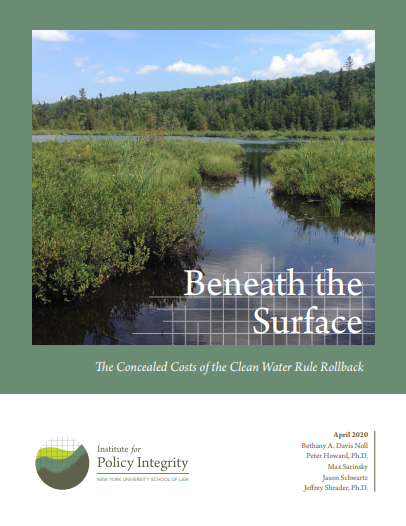-
Beneath the Surface
The Concealed Costs of the Clean Water Rule Rollback
In restricting the scope of the Clean Water Act through two regulatory rollbacks, the Environmental Protection Agency and Army Corps of Engineers claim that the estimated compliance-cost savings exceed the environmental harms (in the form of forgone benefits). Yet these analyses suffer from severe methodological flaws. And correcting the analyses would very likely show that the rollbacks are net costly to society, depriving the public of potentially billions of dollars in annual forgone benefits. As detailed in this report, the agencies’ failure to meaningfully assess the substantial harms that will result from their rollbacks violates both regulatory precedent and the agencies’ legal obligations.
-
New Resource Tracking Reduced Enforcement of Environmental Laws in Response to COVID-19
The Institute for Policy Integrity is tracking altered enforcement of environmental laws by federal and state agencies in response to the COVID-19 pandemic. In connection with the crisis, several agencies have issued waivers or announced plans to stop enforcing key environmental laws and regulations.
-
Amicus Brief on EPA’s Clean Power Plan Replacement Rule
Last year, the Environmental Protection Agency (EPA) replaced the Obama Administration’s Clean Power Plan, which sought substantial cuts in greenhouse gas emissions from power plants, with the so-called Affordable Clean Energy (ACE) rule, a far weaker policy that will, at best, yield modest reductions below business-as-usual emissions and, at worst, increase pollution from the electric sector. We filed an amicus brief in the U.S. Court of Appeals for the D.C. Circuit highlighting three key errors in EPA’s rationale for repealing the Clean Power Plan. Specifically, we explain, EPA misstates regulatory precedent and Clean Air Act legislative history supporting the Clean Power Plan and disregards the substantial harms that the ACE Rule will cause.
-
Comments to EPA on Coal Combustion Residuals Rule
Coal combustion residuals, commonly known as coal ash, are the residual substances that remain after burning coal. They contain several chemicals that are toxic to human health, including arsenic, boron, lead, and mercury. The Environmental Protection Agency (EPA) proposed a rule that amends the regulatory framework for the disposal of coal ash. We submitted comments in January detailing how EPA fails to analyze the forgone benefits of the regulatory changes, which extend deadlines and eligibility for facilities that lack appropriate disposal capacity. We also submitted comments in April focusing on the second part of EPA's proposal, which fails to assess the forgone benefits of allowing facilities to seek approval for alternative basin liners.
-
Comments to EPA on Lead and Copper Regulation Revisions
The Environmental Protection Agency (EPA) proposed revisions to the National Primary Drinking Water Regulation for lead and copper. Our comments ask EPA to more fully monetize the benefits and better assess the significance of non-monetized benefits of the proposal. We also submitted a letter to EPA’s Science Advisory Board (SAB) summarizing our comments and encouraging the SAB to consider our points during its review of the proposed revisions.
-
Comments to CEQ on the National Environmental Policy Act
The Council on Environmental Quality (CEQ) proposed changes to the regulations implementing the National Environmental Policy Act (NEPA), a decades-old statute that requires federal agencies to analyze the environmental impact of actions. We submitted comments explaining how the proposed rule runs afoul of the statute, drastically limiting agencies’ abilities to consider various effects and implement NEPA procedures. We also submitted joint comments detailing how the provisions would undermine analysis of climate effects, and encouraging CEQ to promote the use of the social cost of greenhouse gases.
-
Amicus Brief on Dust-Lead Hazard Standards
The Environmental Protection Agency (EPA) finalized a rule revising standards for lead found in dust on floors, window sills, and in soil. Our amicus brief critiques the rule, which forgoes net beneficial options in favor of weaker standards that will cause significant harms to public health.
-
Comments to EPA on Water and Air Pollution Limitations from Electric Power Generation
The Environmental Protection Agency (EPA) proposed to weaken technology standards adopted in 2015 that act as crucial controls on effluent and emissions from electric power generation. Our comments focus on EPA’s flawed legal and economic justifications for the proposed rule, which contravenes the Clean Water Act, creates harmful incentives to delay compliance with guidelines, and relies on flawed cost-benefit analysis. We also submitted joint comments that detail how EPA severely undervalues the proposed rule’s climate costs and must monetize the full social cost of carbon using the best available data and methodologies.
-
Comments to EPA’s Chartered Science Advisory Board
We submitted four comments in advance of the Environmental Protection Agency’s (EPA) January 2020 meeting of its Chartered Science Advisory Board (SAB).
-
Comments to EPA on Water Quality Trading Proposals
The Environmental Protection Agency (EPA) requested input on policy approaches to promote market-based programs that will improve water quality. We submitted comments suggesting that EPA provides additional clarity, works to avoid undermining key permitting goals, and considers using alternate market-based structures before reissuing its proposals.
Viewing recent projects in Environmental Health











